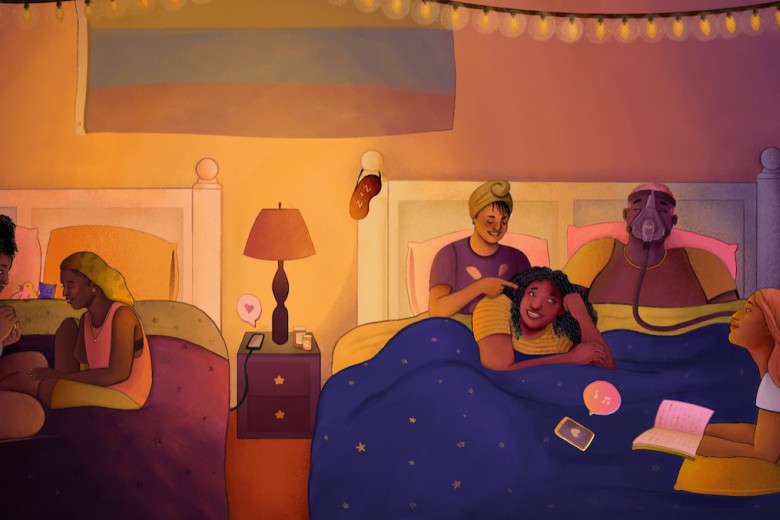
They say once you’re “woke” you can’t go back to sleep. This is quite literally how I feel as I sit on the corner of this thin plastic jailhouse mattress at 4:45 a.m., pouring out my thoughts on this paper. I am awake not only because sleep is evading me – my living conditions compounded with my severe hypochondria are probably the driving forces behind my insomnia.
I was recently moved to a unit designated for older, ailing prisoners. When I walked into this unit, the first thing that hit me was the smell. It reminded me of a hospital, but worse. There was a lingering pungent smell of feces, urine, and what I now know to be lack of showers. The smell hit me like a right hook to the nostrils. As a 36-year-old, it’s unnerving to be surrounded by so many older inmates, who seem to be intimidated by my mere presence. Many of them are aging before their time, their bodies breaking down at an accelerated pace, partially due to the harsh conditions of confinement. I guess this is just another example of how criminalization and incarceration can lead to death by a thousand cuts.
When I first arrived at the range where I am currently housed I was, frankly, put off by my surroundings. For that reason, I was planning on delving deeper into the cognitive disorders I faced after being forced to move to this unit. Many of my fellow prisoners exhibit symptoms of psychosis, depression, and withdrawal. I was initially overwhelmed and taken aback by some of these prisoners’ erratic behaviors. The obvious mental health challenges my cohort was facing had a negative effect on me and led to the decline of my own mental health. However, after a few months on this range I was struck by the living conditions of these ailing prisoners and felt compelled to talk about their struggles instead of mine. These older prisoners are closing out the final chapters in their books of this journey called life. They are suffering ever so slowly. Every degrading experience must feel like another cut to their self worth.
Many of them are aging before their time, their bodies breaking down at an accelerated pace, partially due to the harsh conditions of confinement. I guess this is just another example of how criminalization and incarceration can lead to death by a thousand cuts.
The cell I was assigned to has dried piss caked on the floor beside the toilet; snot and god knows what other bodily excrements are smeared all over the walls and by the bed area, where one would rest their head. There are also cobwebs in every crevice and corner. These cells look like something straight from a horror movie set. It gives me the heebie-jeebies and makes me cringe. Every night I have spent in this cell, I feel like creatures are crawling all over me. I personally suffer from arachnophobia, so this doesn’t sit well with me.
It seems to me that because this range has been designated for the ailing and elderly, not much cleaning gets done. There are no external staff employed to clean the residential sections of the prison range. Prisoners are responsible for cleaning their own units, and cleaning the unit corridors is considered a prison job that prisoners are given institutional pay to complete. These workers are paid well below minimum wage, anywhere from $4 to $6 a day. As a result, if prisoners are too sick or don’t have the mobility to clean their living quarters, it simply doesn’t get done.
As a matter of fact, I don’t think the elderly prisoners here do much of anything. Not because they are mentally or physically incapable – I believe it has more to do with their lack of motivation. I often wonder if their motivation levels are affected by the assortment of pills most of these prisoners are seemingly coerced to ingest daily. I say “coerced” because I have noticed some prisoners are constantly told by Correctional Service Canada (CSC) health-care providers that they need to take the medications they are offered daily for the betterment of their health, yet I hear the prisoners’ constant complaints about how the medications make them feel after ingestion. Some prisoners express being constantly tired or in pain as a result of taking their medications, while others say that if they don’t take their medication, they cannot move at all. Some prisoners say that if they miss a dose or stop taking their medication, their bodies tend to crash and they feel like they are reduced to a semi-comatose state. Over my years of incarceration, I have noticed a few occasions when a psychologist or a doctor has recommended that a prisoner see a psychiatrist and the prisoner is then prescribed antipsychotics or antidepressants. When this happens, it gets noted in the prisoner’s correctional plan that they must take their prescribed medication. If they don’t follow the correctional plan, it can lead to extra years of incarceration.
As a result, if prisoners are too sick or don’t have the mobility to clean their living quarters, it simply doesn’t get done.
This prison, which is currently one part of the Federal Training Centre, was once used to house Canada’s “most violent convicts” when it was a super-maximum security prison called the Correctional Development Centre (CDC). In 1984 the CDC was closed and now it’s used to house minimum security prisoners – Canada’s super harmless. Most of these prisoners can’t remember their family members’ phone numbers or if they’ve had a shower in the past few days. There is one older guy specifically who sleeps in the common room areas all day long and paces the unit corridors all night long without pants or sometimes in the nude. On a few occasions, I noticed him peeing in the kitchen sink. When I caught him the first time I asked him, in French, why he was doing this because his cell is literally 20 steps away. French is his only language and I’m an anglophone who speaks limited French, so in order for me to connect with him I had to speak with him in my broken Franglais. He began telling me a long, spiralling story that ended in him crying and asking me to pray for him. I felt horribly for him. It was clear to me in that moment that this prisoner is mentally ill and should be in a hospital, not a prison. But this is Corrections Canada for you.
I don’t know the facts surrounding the convictions of these elderly and frail convicts – there’s an unwritten prison rule not to ask another convict why they are imprisoned. The rule helps maintain privacy and respect between prisoners – and beyond that, once you’re made aware of a fellow convict’s record it can be easy to judge them and feel anger toward them based on your own moral compass, which can lead to conflict. Granted, some older and now ailing prisoners are imprisoned for heinous crimes. Nevertheless, the majority of these prisoners are now seemingly incapable of inflicting harm on anyone. Some are serving life sentences and others are serving shorter sentences. One thing that unites many of them is a severe dependence on medications that tend to pacify them or soothe their pain by putting them to sleep – similarly to a palliative care patient.
I say “coerced” because I have noticed some prisoners are constantly told by Correctional Service Canada (CSC) health-care providers that they need to take the medications they are offered daily for the betterment of their health, yet I hear the prisoners’ constant complaints about how the medications make them feel after ingestion.
Many years ago I couldn’t fathom being imprisoned with inmates as ill as the older man I mentioned earlier. Some Canadian prisons group ailing and elderly prisoners together in the same units or ranges. But older prisoners with mental and physical disabilities need health care more than incarceration. Many of them are more like infants than able-bodied prisoners. You know what they say: once a man and twice a child. As a lifer, I spent time in maximum-security prisons before being transferred to medium- and then minimum-security prisons. The lower my security classification, the more bizarre the environments become. Institutional heads herd us all together like cattle or sheep. They place the ailing with the healthy, all the while expecting the ailing to survive and the healthy to maintain their sanity.
Realistically, though, on the inside there may not be much of a difference between the mentally well and the mentally unwell. It’s more of a spectrum. Consider how I have been treated throughout my incarceration (you can read more of my writing about prison at freedomisamust.net), then try to imagine being treated this way day in and day out for years, and maybe you will see clearly what the system has the capability of doing. Throughout my incarceration I have been involuntarily transferred hundreds of miles away from my family and friends, I’ve been placed in solitary confinement for extended periods without proper justification, I’ve been assaulted, degraded, humiliated, and deceived.
Did these men become mentally ill by way of maltreatment bestowed upon them by a system that was supposed to rehabilitate them? Why are CSC staff being substituted for much needed external, independent psychologists, psychiatrists, program instructors, and other health-care professionals? Is this rehabilitation or punishment? You be the judge. If you ask me, I think there needs to be a complete demolition of this draconian practice of imprisonment in order to give way to a more inclusive system of corrections – one that is truly built on rehabilitation, not punishment or oppression. In the words of Canada’s correctional investigator, Ivan Zinger, “Safe custody and humane treatment behind bars can only be achieved through the recognition that corrections is in the human rights business.” The system needs to be transformed and funds need to be reallocated to better serve the prison population. #DefundtheJustUsSystem
Real talk
From a real inmate
Doing real time
In a real systemically racist system.






